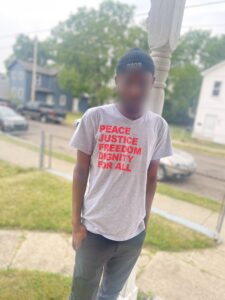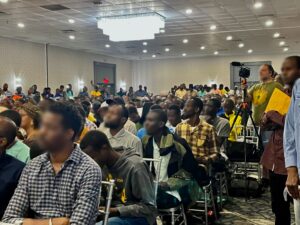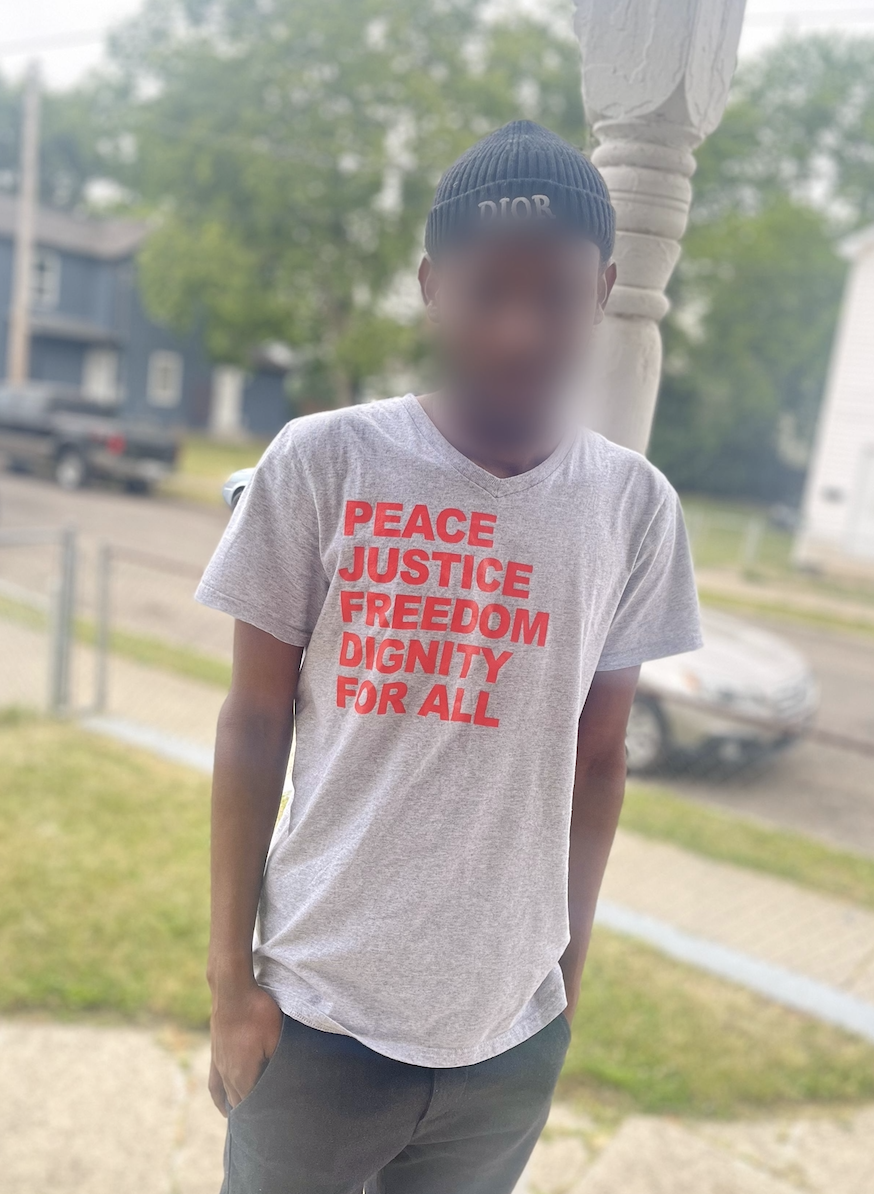It’s time for the rest of us to help.
(Cross-posted from Medium)
On June 10, the Mauritanian Network for Human Rights called a meeting and more than 500 Black Mauritanians—newcomers to Ohio and Kentucky— showed up. The topic? How to apply for asylum in the US.

A man stands outside a home in Hamilton, Ohio, wearing a shirt he got from ICE as he was released from custody. He and hundreds like him are preparing to file for asylum in the US due to apartheid and slavery in Mauritania. (Photo credit: Ohio Immigrant Alliance © 2023)
Apartheid in Mauritania has grown worse in recent months, with police murdering, attacking, and disappearing people. The ruling institutions, led by White Moors, want the world to view Mauritania as an “Arab state.” But there are millions of Black people living on this land, as their families have done for centuries. They demand rights, recognition, and dignity.
The group of Mauritanian refugees who came to the US after the late 80s/early 90s genocide are older now, but they still have that activist energy. They will never give up on the demand to be treated as humans in their own country. The new group of refugees are mainly young people—mostly men but some women—because the government sees young Black people as a threat.
After police murdered Oumar Diop and Mohamed Lemine, you would think the world would understand that the true threats are the people doing the killing. But the Mauritanian government’s PR machine is masterful at driving a narrative. Mauritania may be rich in natural gas, but gaslighting is even more prevalent. And when all else fails, they’ll just shut off the Internet to keep the world from learning what is really going on.
The vibrant community of Black Mauritanians in greater Cincinnati has been making heroic sacrifices to house, clothe, and feed the newcomers; get them to their ICE check-in appointments; and try to find them legal representation. This has been going on for a while now, but the rest of us did not know until recently. It seems that every Mauritanian has at least one newly arrived asylum seeker living with them — and usually many more than that.

Young people attend an asylum clinic in Cincinnati on June 10. (Photo credit: Ohio Immigrant Alliance © 2023)
The Mauritanian Network for Human Rights’ legal briefing featured lawyers from the Legal Aid Society of Greater Cincinnati and private attorneys. Amadou Dia and the Mauritanian Network pulled off an amazing feat. The spirit in the room was of mutual understanding and community support. People leading the discussion had been in these young people’s shoes twenty to thirty years ago. They have always advocated for human rights and an end to slavery and apartheid in Mauritania. Now they are leading the assistance effort and their children are helping with interpretation, fundraising, and even giving up their bedrooms so others can use them.
I’ve been struck by how much the Mauritanian community has been carrying on its shoulders, alone. The videos of police violence in Mauritania, circulating on social media, and the frantic messages from loved ones, have to be retraumatizing. And then, to house one or more new people and try to help them apply for asylum, knowing the stakes are so high if they are denied — it’s a lot to bear.
So this is a call to all Ohioans who have not already mobilized to welcome Black Mauritanians. Everyone can do something to help. What will you do today? You can:
- Help pay for basic needs (rents, bills, groceries). The people who apply for asylum will be allowed to apply for work permits, but that will take several months. Until then, they will need financial support. Please donate to this community fundraiser.
- Create housing solutions around Ohio. There are many abandoned homes that need rehabbing. Some large churches are no longer being used. We can repurpose empty spaces to become safe and comfortable homes, a long-term community benefit.
- Call on President Biden and the Department of Homeland Security to designate Temporary Protected Status for Mauritania. Temporary Protected Status is a provision in US law that the federal government can invoke when a country is in crisis, as Mauritania is today. It would provide people with immediate access to work permits and remove the fear of deportation, at least for the time period it remains in place. TPS is a much-needed bridge for people seeking asylum, as that process will likely take years.
I do not consider this “help for the needy.” The people who need assistance today are strong, brave, intelligent, and resilient. Many told us that the journey here was the hardest thing they have ever done. With the arms of the established Black Mauritanian community around them, they already feel less scared. They are eager to get settled in the US and feel useful. They will be wonderful neighbors, friends, and coworkers when they find their footing. And, they will be helping others in no time, too.
There is bipartisan support for designating TPS for Mauritania in Congress. Senator Sherrod Brown and Rep. Mike Carey are leading the way. We can help by calling on the rest of the Ohio congressional delegation to join them, and contacting the White House and DHS today.
For more, read “Black Mauritanians Ongoing Search for Safety” by the Ohio Immigrant Alliance.

